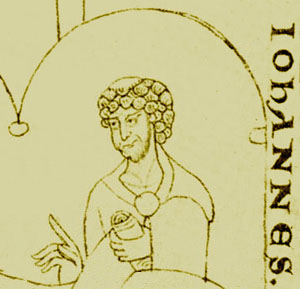John Scotus Eriugena

John Scotus Eriugena or Johannes Scotus Erigena (* early 9th century; † late 9th century) was a West Frankish monk of Celtic-Irish origin who worked at the court of Charles the Bald (823-877) as a teacher of the seven liberal arts and wrote numerous philosophical and theological works. As was customary at the time, he based his teaching on the encyclopaedic work De nuptiis Philologiae et Mercurii ("The Marriage of Philology with Mercurius") by Martianus Capella, which he also commented on in detail. Through his logically clean line of thought in the theological argumentation, Scotus Eriugena was already preparing the scholastic way of thinking. Due to his good, if not excellent, knowledge of Greek, which was very rare at the time,[1] he was able to translate many works of the Greek philosophers and Church Fathers into Latin and comment on them, thus making them accessible and contributing above all to the dissemination of Neoplatonic thought. His translation of the works of Dionysius Areopagita, which were drawn from deep esotericism and had a decisive influence on the Christian doctrine of Angels, was particularly significant. Eriugena also found significant inspiration in Gregory of Nyssa (* around 335/340; † after 394) and Maximus Confessor (* around 580; † 662). Eriugena's main work, the Periphyseon (Greek: Περὶ φύσεων "On Natures", "On the Classification of Nature"), divided into five books, provides rich information about his thought. In the School of Chartres, the works of John Scotus Eriugena were highly esteemed, but were later condemned several times because of their audacious thought and many copies of his writings were burned.
Literatur
- Johannes Scotus Erigena, Ludwig Noack (Übers.): Über die Eintheilung der Natur, Verlag von L. Heimann, Berlin 1870 pdf
- Wolf-Ulrich Klünker: Johannes Scotus Eriugena - Denken im Gespräch mit dem Engel, Verlag Freies Geistesleben, Stuttgart 1988, ISBN 978-3-7725-0826-4
- Rudolf Steiner: Die Mystik im Aufgange des neuzeitlichen Geisteslebens und ihr Verhältnis zur modernen Weltanschauung, GA 7 (1990), ISBN 3-7274-0070-6 English: rsarchive.org German: pdf pdf(2) html mobi epub archive.org
- Rudolf Steiner: Das Christentum als mystische Tatsache und die Mysterien des Altertums, GA 8 (1989), ISBN 3-7274-0080-3 English: rsarchive.org German: pdf pdf(2) html mobi epub archive.org
- Rudolf Steiner: Die Rätsel der Philosophie in ihrer Geschichte als Umriß dargestellt, GA 18 (1985), ISBN 3-7274-0180-X English: rsarchive.org German: pdf pdf(2) html mobi epub archive.org
- Rudolf Steiner: Über Philosophie, Geschichte und Literatur, GA 51 (1983), ISBN 3-7274-0510-4 English: rsarchive.org German: pdf pdf(2) html mobi epub archive.org
- Rudolf Steiner: Die Philosophie des Thomas von Aquino, GA 74 (1993), ISBN 3-7274-0741-7 English: rsarchive.org German: pdf pdf(2) html mobi epub archive.org
- Rudolf Steiner: Perspektiven der Menschheitsentwickelung, GA 204 (1979), ISBN 3-7274-2040-5 English: rsarchive.org German: pdf pdf(2) html mobi epub archive.org
- Rudolf Steiner: Menschenwerden, Weltenseele und Weltengeist – Zweiter Teil, GA 206 (1991), ISBN 3-7274-2060-X English: rsarchive.org German: pdf pdf(2) html mobi epub archive.org
- Rudolf Steiner: Das Geheimnis der Trinität, GA 214 (1999), ISBN 3-7274-2140-1 English: rsarchive.org German: pdf pdf(2) html mobi epub archive.org
- Rudolf Steiner: Der Entstehungsmoment der Naturwissenschaft in der Weltgeschichte und ihre seitherige Entwickelung, GA 326 (1977), ISBN 3-7274-3260-8 English: rsarchive.org German: pdf pdf(2) html mobi epub archive.org
 |
References to the work of Rudolf Steiner follow Rudolf Steiner's Collected Works (CW or GA), Rudolf Steiner Verlag, Dornach/Switzerland, unless otherwise stated.
Email: verlag@steinerverlag.com URL: www.steinerverlag.com. Index to the Complete Works of Rudolf Steiner - Aelzina Books A complete list by Volume Number and a full list of known English translations you may also find at Rudolf Steiner's Collected Works Rudolf Steiner Archive - The largest online collection of Rudolf Steiner's books, lectures and articles in English. Rudolf Steiner Audio - Recorded and Read by Dale Brunsvold steinerbooks.org - Anthroposophic Press Inc. (USA) Rudolf Steiner Handbook - Christian Karl's proven standard work for orientation in Rudolf Steiner's Collected Works for free download as PDF. |
